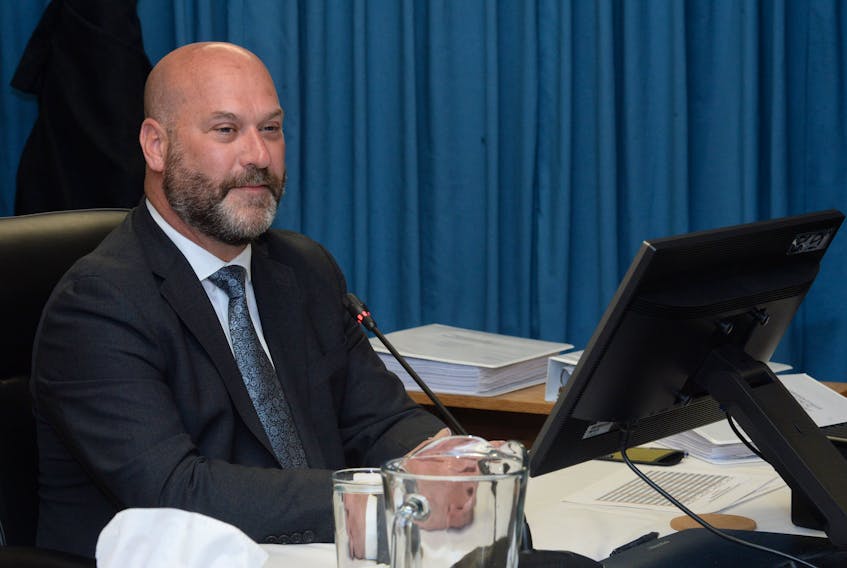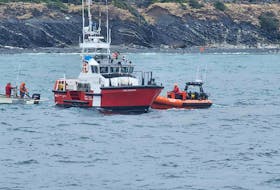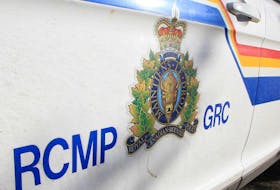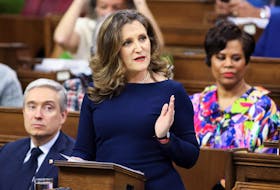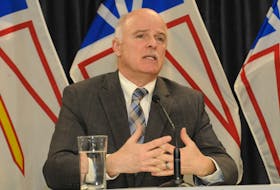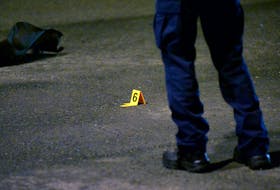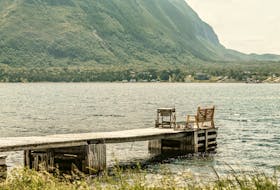ST. JOHN'S, N.L. — The Muskrat Falls Inquiry is delving into whether or not it was reasonable to exempt the megaproject from the province’s Public Utilities Board. It is also looking at whether or not the government was made fully aware of any risks or problems anticipated with the project.
When it comes to oversight, Charles Bown, the former deputy minister of Natural Resources (now at Tourism) has shed more light on what was happening behind the scenes in 2012, before the project was sanctioned.
Testifying Thursday, Bown was pressed by Chris Peddigrew, a lawyer for the Consumer Advocate. Peddigrew directed attention to a summary of some input received from former chair of the Public Utilities Board Robert Noseworthy, who was hired by the government as an independent consultant. Among other things, Noseworthy advised there should be “significant and meaningful independent oversight” established for the Muskrat Falls project.
Bown was on the government’s oversight committee when it was established nearly two years later. The original oversight committee was filled with government bureaucrats.
He was asked if he felt the committee as established met the standard Noseworthy recommended. “Yes,” he responded.
Peddigrew referred to another recommendation from Noseworthy, from before the project’s sanctioning.

“With the ratepayer being required to cover all costs incurred on the project, it is incumbent on the province to ensure that costs are independently reviewed and released to the public in a report,” he read out.
“Did that happen?” Peddigrew asked. “Were the costs of he project independently reviewed?”
Bown referred to the work of the oversight committee after it was established and the work of EY, saying he believes the recommendation was met.
“I believe so,” he said.
Peddigrew referred to another page, with notes from October 2012, still before the project’s public green light, summarizing a meeting of representatives from the Department of Natural Resources with Noseworthy.
Peddigrew then referred Bown to a draft, internal “direction note,” compiled by staff in Natural Resources, Finance and Justice and dated Nov. 27, 2012. It refers to Noseworthy’s submission to the government, and repeats the statement of the need for “significant and meaningful independent oversight.”
“Mr. Robert Noseworthy believes this (construction) phase is more challenging and suggests the appointment of a representative group to consider this matter and make recommendations on future ongoing oversight for the project following commissioning,” it reads.
But notably, Noseworthy recommended who might be on the oversight body. He included the consumer advocate, the auditor general, a former chair or chief executive officer of the Public Utilities Board and a representative tied to the construction work.
“Government could consider such a committee or another of similar structure, including a former chair of a regulatory agency from outside the province,” it reads.
Peddigrew then referred Bown to an email Bown had received from former clerk of the executive council Robert Thompson in December 2012. It referred to the draft note, with the statements above.
Thompson mentioned the bills for the legislation that would lock provincial ratepayers into paying for the project.
“Ideally we would have an approved accountability and oversight process to announce simultaneous with the bill,” he told Bown.
At the inquiry, Peddigrew asked why that didn’t happen.
Bown said teams of departmental staff were working on the oversight issue, but were also pulled off to work on the bills and information for the House of Assembly. In addition, he said, the same staff were working on the commercial arrangements between Nalcor Energy and Emera, and with the Government of Canada. Multiple people, including Bown, were also expected to monitor Nalcor Energy and report on changes in project cost and plans to their respective ministers – something Bown was grilled on in testimony earlier this week.
“We’re here now in December,” Bown said, referring to Thompson’s email, “and had run out of time.”
“Ran out of time to put oversight in place?” Peddigrew asked.
“Yes,” Bown replied.
At that time in 2012, construction was already underway. The provincial government established its oversight committee in March 2014.
Bown testified the committee did require the help of EY to get up and running, but also that he believes it has become more effective as the project has progressed.
On April 10, 2017, the Liberal government added four new members to the committee, reducing the reliance on government staff.
Twitter: @TeleFitz
RELATED

